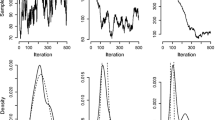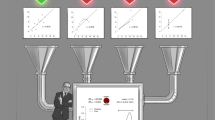Abstract
Scenario analysis is often used to identify possible chance events. However, no formal, computational theory yet exists for scenario analysis. In this paper, we commence development of such a theory by defining a scenario in an argumentation context, and by considering the question of when two scenarios are the same.
Similar content being viewed by others
References
Amgoud, L. and Parsons, S., “Agent Dialogues with Conflicting Preferences,” inPre-Proc. of the Eightin International Workshop on Agent Theories, Architectures, and Languages (ATAL 2001) (Meyer, J.-J. and M. Tambe, eds.), pp. 1–14, 2001.
Boltzmann, L., “Weitere Studien über das Wärmegleichgewicht unter Gasmolekülen,”Wissenschaftliche Abhandlungen, 1, 316–402, 1872.
Carter, T. R., La Rovere, E. L., Jones, R. N., Leemans, R., Mearns, L. O., Nakicenovic, N., Pittock, A. B., Semenov, S. M. and Skea, J., “Developing and Applying Scenarios,”3, pp. 145–190 of Reference.15)
Fox, J. and Parsons, S., “Arguing about Beliefs and Actions,”Applications of Uncertainty Formalisms (Hunter, A. and Parsons, S., eds.), LNAI 1455, 266–302, Springer, 1998.
Gibbs, J. W.,Elementary Principles in Statistical Mechanics, Developed with Especial Reference to the Rational Foundation of Thermodynamics, Yale University Press, 1902 (Reprinted by Dover, New York, 1962).
Hamblin, C. L.,Fallacies, Methuen, 1970.
Hitchcock, D., McBurney, P. and Parsons, S., “A Framework for Deliberation Dialogues,” inProc. of the Fourth Biennial Conference of the Ontario Society for the Study of Argumentation (OSSA 2001) (Hansen, H. V., Tindale, C. W., Blair, J. A. and Johnson, R. H., eds.), 2001.
Ironside, J. W., “nvCJD: Exploring the Limits of Our Understanding,”The Biologist, 46, 4, 172–176, 1999.
Krause, P., Ambler, S., Elvang-Gørannson, M. and Fox, J., “A Logic of Argumentation for Reasoning under Uncertainty,”Computational Intelligence, 11, 1, pp. 113–131, 1995.
McBurney, P., “First International Workshop on Chance Discovery,”Knowledge Engineering Review, 16, 2, pp. 215–218, 2001.
McBurney, P. and Parsons, S., “Chance Discovery Using Dialectical Argumentation,”Joint JSAI 2001 Workshop Post Proc. of New Frontiers in Artificial Intelligence (Terano, T., Nishida, T., Namatame, A., Tsumoto, S., Ohsawa, Y. and Washio, T., eds.), LNAI 2253, pp. 414–424, Springer, 2001.
McBurney, P. and Parsons, S., “Intelligent Systems to Support Deliberative Democracy in Environmental Regulation,”Information and Communications Technology Law, 10, 1, pp. 33–43, 2001.
McBurney, P. and Parsons, S., “Representing Epistemic Uncertainty by Means of Dialectical Argumentation,”Annals of Mathematics and AI, 32, 1–4, pp. 125–169, 2001.
McBurney, P. and Parsons, S., “Games That Agents Play: A Formal Framework for Dialogues between Autonomous Agents,”Journal of Logic, Language and Information, 11, 3, pp. 315–334, 2002.
“Climate Change 2001: Impacts, Adaptation and Vulnerability. Intergovernmental Panel on Climate Change” (McCarthy J., Canziani, O. F., Leary, N. A., Dokken, D. J. and White, K. S., eds.), Cambridge University Press, 2001.
van Notten, P., “Foresight in the Face of Scenario Diversity,”International Conference on Probing the Future: Developing Foresight in the Knowledge Economy (Tsoukas, H. and Shepherd, J., eds.), Graduate School of Business, University of Strathclyde, 2002.
Ohsawa, Y., “Chance Discoveries for Making Decisions in Complex Real World,”New Generation Computing, 20, 2, 2002.
Paris, J. and Vencovská, A., “A Model of Belief,”Artificial Intelligence, 64, pp. 197–241, 1993.
Schwartz, P.,The Art of the Long View, Doubleday, 1991.
Author information
Authors and Affiliations
Corresponding author
Additional information
Peter McBurney, Ph.D.: He is a lecturer in the Department of Computer Science at the University of Liverpool, UK. He has a first degree in Pure Mathematics and Statistics from the Australian National University, Canberra, and a Ph.D in Artificial Intelligence from the University of Liverpool. His Ph.D research concerned the design of protocols for rational interaction between autonomous software agents, and he has several publications in this area. Prior to completing his Ph.D he worked as a consultant to major telecommunications network operating companies, primarily in mobile and satellite communications, where his work involved strategic marketing programming.
Simon Parsons, Ph.D.: He is currently visiting the Sloan School of Management at Massachusetts Institute of Technology (MIT) and is a Visiting Professor at the University of Liverpool, UK. He holds a first degree in Engineering from Cambridge University, and an MSc and Ph.D in Artificial Intelligence from the University of London. In 1998, he was awarded the Young Engineer Achievement Medal of the British Institution of Electrical Engineers (IEE), the largest professional engineering society in Europe. He has published 4 books and over 100 articles on autonomous agents and multi-agent systems, uncertainty formalisms, risk and decision-making.
About this article
Cite this article
McBurney, P., Parsons, S. Chance discovery and scenario analysis. NGCO 21, 13–22 (2003). https://doi.org/10.1007/BF03042322
Received:
Issue Date:
DOI: https://doi.org/10.1007/BF03042322




